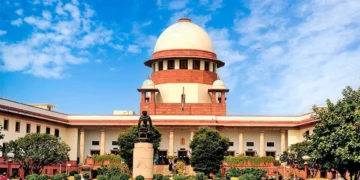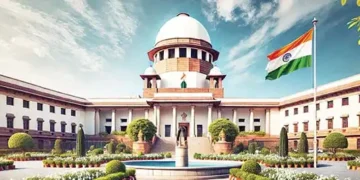 The Uniform Civil Code (UCC) calls for the formulation of one law for India, which would be applicable to all religious communities in matters such as marriage, divorce, inheritance and adoption. The code comes under Article 44 of the Constitution, which lays down that the state shall endeavour to secure a Uniform Civil Code for the citizens throughout the territory of India.
The Uniform Civil Code (UCC) calls for the formulation of one law for India, which would be applicable to all religious communities in matters such as marriage, divorce, inheritance and adoption. The code comes under Article 44 of the Constitution, which lays down that the state shall endeavour to secure a Uniform Civil Code for the citizens throughout the territory of India.
The issue has been at the center of political narrative and debate for over a century, with proponents arguing that it is essential for promoting gender equality, ensuring social justice, and strengthening national unity. On the other hand, the reservations remain that it would infringe on the religious rights of different communities and may not be acceptable to all.
The idea of a Uniform Civil Code was discussed at length during the drafting of the Indian Constitution by the Constituent Assembly. The debates and discussions provide valuable insights into the reasons why a Uniform Civil Code was seen as necessary at that time and why it remains a relevant issue today.
Tracing the history
The discussions on the Uniform Civil Code took place primarily in the subcommittee on Fundamental Rights, which was chaired by Sardar Vallabhbhai Patel. The subcommittee was tasked with drafting the chapter on Fundamental Rights, including Article 44, which calls for a Uniform Civil Code.
The members of the subcommittee were acutely aware of the need for a Uniform Civil Code to ensure gender equality and social justice. Many of them argued that the existence of different personal laws for different religions was a major impediment to the goal of creating a modern and secular nation.
For instance, K.M. Munshi, a member of the subcommittee, argued that “a common civil code will help in the elimination of discrimination based on religion and provide equal rights to all citizens, irrespective of their religion or community.” He further added that “the goal of creating a secular nation cannot be achieved as long as personal laws are based on religious beliefs.”
Ambedkar was for it
B.R. Ambedkar, the chairman of the Drafting Committee, also spoke in favor of a Uniform Civil Code. In his view, a Uniform Civil Code was essential for promoting national unity and preventing the growth of communalism. He said, “It is absolutely necessary that there should be a uniform civil code in this country. There cannot be any real democracy unless there is a uniform civil code.”
However, there were also concerns that a Uniform Civil Code could be seen as an imposition of Hindu laws on other religions. Members representing minority religions in the subcommittee, in particular, were opposed to the idea of a Uniform Civil Code, fearing that it would infringe on their religious rights.
In response, some members of the subcommittee suggested that a Uniform Civil Code could be implemented gradually, with different communities being given time to adjust to the new laws. They also suggested that a Uniform Civil Code could be based on the principles of the Constitution and the Universal Declaration of Human Rights, rather than on any specific religious tradition.
Article 44 included Despite the debates and discussions, the subcommittee ultimately included Article 44 in the chapter on Fundamental Rights, calling for a Uniform Civil Code. However, the article was made nonjusticiable, meaning that it could not be enforced through the courts. This was done to avoid a direct confrontation with religious groups and to allow for gradual progress towards a Uniform Civil Code.
The discussions on the Uniform Civil Code held by the Constituent Assembly show that the issue has been debated and discussed for many years. The members of the Assembly recognized the need for a Uniform Civil Code to ensure gender equality, social justice, and national unity. However, they also recognized the need to be sensitive to the concerns of different religious communities and to allow for gradual progress towards a Uniform Civil Code.
Gender, equality, justice
One of the primary arguments in favor of a Uniform Civil Code is that it is essential for promoting gender equality and social justice. India is a diverse country with different religious communities, each of which has its own set of personal laws governing various aspects of life, such as marriage, divorce, inheritance, and property rights. These laws are often discriminatory against women, treating them as second-class citizens and denying them basic rights.
For example, under Muslim personal law, a man can unilaterally divorce his wife by uttering the word ‘talaq’ three times, without providing any justification or going through a legal process. This practice, known as triple talaq, has been declared unconstitutional by the Supreme Court but is still prevalent in some parts of the country. Similarly, under Hindu personal law, women have limited inheritance rights, and a widow is often treated as a burden on the family.
A Uniform Civil Code would help to eliminate these discriminatory practices and ensure that all citizens, regardless of their religion, are treated equally under the law. It would also provide a level playing field for women, who are often at a disadvantage under the current system.
National unity
Another argument in favor of a Uniform Civil Code is that it is essential for promoting national unity and integration. India is a secular country, where people of different religions and communities live together. However, the existence of different personal laws for different religions creates a sense of division and alienation, with each community feeling that its rights and traditions are being threatened.
A Uniform Civil Code would help to break down these barriers and promote a sense of unity and common identity. It would also help to strengthen the country’s secular fabric by promoting a common set of values and principles that are applicable to all citizens.
Constitutional obligation
The implementation of a Uniform Civil Code is also a constitutional obligation under Article 44 of the Indian Constitution, which states that “the State shall endeavour to secure for the citizens a Uniform Civil Code throughout the territory of India.” This provision was included in the Constitution with the aim of promoting national integration and ensuring social justice.
However, despite being a constitutional obligation, successive governments have been reluctant to implement a Uniform Civil Code, fearing a backlash from religious groups and communities. As a result, the country has continued to live with a fragmented legal system that is often discriminatory and unfair.
SC recognises the need
The Supreme Court has recognized the need for a Uniform Civil Code to ensure gender equality, social justice, and national integration. However, the court has also been mindful of the concerns of minority communities and has called for a gradual and sensitive approach towards the implementation of a Uniform Civil Code. The same has been held through the following cases:
Shah Bano case (1985): The landmark Shah Bano case was a turning point in the debate over the Uniform Civil Code. The case involved a Muslim woman who had been divorced by her husband and was seeking maintenance under the Muslim Personal Law. The Supreme Court held that Muslim women were entitled to maintenance under the Code of Criminal Procedure, which was applicable to all citizens regardless of religion. The court observed that the Muslim Personal Law was discriminatory towards women and that a Uniform Civil Code was necessary to ensure gender equality.
Sarla Mudgal case (1995): In the Sarla Mudgal case, the Supreme Court held that a Hindu husband who converts to Islam cannot escape his obligation to pay maintenance to his wife under the Hindu Marriage Act.
The court noted that there was a need for a Uniform Civil Code to eliminate the differences in personal laws and to ensure gender justice.
John Vallamattom case (2003): In the John Vallamattom case, the Supreme Court held that a Christian husband who converts to Islam cannot avoid his obligations under the Indian Divorce Act, which governs Christian marriages. The court observed that the absence of a Uniform Civil Code was a “disturbing feature” and that there was a need to move towards a common code for all citizens.
Shayara Bano case (2017): The Supreme Court declared the practice of triple talaq among Muslims as unconstitutional and struck it down. The court observed that triple talaq was against the principles of gender justice and that there was a need for a Uniform Civil Code to ensure gender equality and non-discrimination.
Conclusion
In conclusion, the implementation of a Uniform Civil Code is essential for promoting gender equality, social justice, and national unity in India. It would help to eliminate discriminatory practices and ensure that all citizens, regardless of their religion, are treated equally under the law. It would also help to promote a sense of common identity and values, strengthening the country’s secular fabric. While there may be opposition from certain religious groups, the implementation of a Uniform Civil Code is a constitutional obligation that needs to be fulfilled for the greater good of the country and its citizens.

























